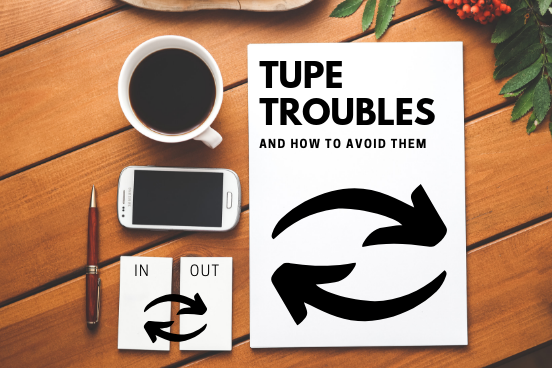
The Transfer of Undertakings (Protection of Employment) Regulations, (TUPE) typically comes into tendering where public sector services are outsourced. TUPE is often a source of confusion especially when the staff transfer stage begins. However, in terms of tendering, navigating TUPE is usually quite straight forward.
What is TUPE?
The TUPE regulations protect employees against unscrupulous business and employment practices. TUPE protects against job risk when a service contract is passed from one supplier to another. TUPE also protects existing employment terms as well as pay and pension rights for staff involved in the transfer.
There is of course, more to it than that but in this blog we will only look at TUPE in the context of tendering.
What Has TUPE Got to Do With My Tender?
Pricing
Where an existing service is being put out to tender, the staff currently providing those services may be eligible for transfer to the new provider. Where this is the case, details of those employees must be provided to all tenderers as part of the tendering process.
Either:
- The client will provide the TUPE information in the tender. They will then field all questions about that information through official clarification process. This is the most common route.
OR
- The client will not assist in the obtaining of TUPE information from the incumbent(s) other than providing their contact details. All correspondence about that information will then have to be direct with the incumbent supplier(s).
You will then be able to incorporate the likely costs from the transfer into your pricing.
There Will Be Questions in the Quality Response About TUPE
There will almost certainly be at least one question about your TUPE processes in the quality response if TUPE is likely to apply. This will usually be as a stand alone question or part of the questions on mobilisation.
What Will They Ask Me?
The buyer will most likely want to know about your process for transferring staff. They may ask for examples of your experience to demonstrate that your process has been tested and works well. Typical primary concerns include:
-
Communication
You will need to explain how you will keep the transferring staff informed and up to date. You must describe how you will explain the process to them and reassure them of continuity of their employment.
-
Training
The client will usually expect you to describe your process for reviewing new personnel records with a view to identifying any training needs. You will then need to explain how gaps will be filled.
You will also need to describe your staff induction process. This will include information on what you usually provide to transferring staff. For example:
- Changes in service provision under the new contract.
- Company policies and procedures, (health and safety, quality and so on).
- Company codes of conduct and expectations.
-
Recruitment and Retention
The client will want to know about your approach to retaining the staff who are transferring. Often people jump ship before the process has even begun so you will also need to explain your approach to recruitment.
-
Protection of Pension Rights
This is very important. You must be clear about what you will provide and that you will comply with all relevant legislation and client requirements.
Remember to Ask Questions
No matter how mundane or silly they may sound, you must always remember to ask questions.
- Seek advice if you are confused about the information you have received. The chances are others will be too.
- Ask for more if information is missing or incorrect.
- Request contact details if the client has chosen to unhelpfully refer you to the incumbent.

Still Confused?
Don’t be. For the purposes of the tender you need to focus on pricing and making sure you have all the information you need to respond to the questions about your process and experience.
There are legalities and practicalities you will need to get right but these are largely matters you will need to manage internally to be ready for mobilisation. These aspects of TUPE are not generally discussed in tenders.
Did you enjoy this post?
Click here to learn more about how social value can help you win more tenders.
Follow Bespoke Bids on Linkedin to keep up with our day-to-day operations. We post live tenders, tips and tricks and more.


